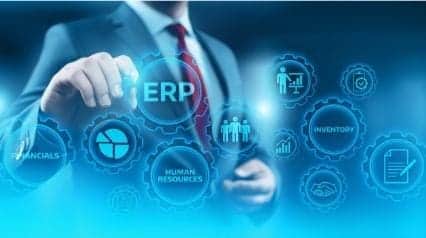Why You Need an ERP for Your Business
Learn about ERP, how it works, and why it is essential for your business

Published 16 Apr 2024
Article by
3 min read
What is Meant by ERP?
ERP stands for Enterprise Resource Planning, which is a process by which organizations can manage and integrate all of their essential business functions into a single software platform. These functions include finance, manufacturing, project management, human resources, and marketing.
Typically,ERP systems are deployed in order to consolidate previously disparate business or enterprise functions into a more cohesive and streamlined system. Doing so can provide numerous benefits for businesses of all sizes, including enhanced efficiency, streamlined workflows, improved decision-making, and increased competitiveness.
How Does It Work?
ERP works by integrating different aspects of a business such as accounting,manufacturing, and sales. It allows businesses to have a more complete view of their operations and increase visibility of the current business processes that they have, which makes it easier to track and manage important business data. ERP also helps businesses create and track invoices, purchase orders, and other important documents.
How Is It Used and Implemented in Companies?
ERP systems or ERP modules are typically implemented by businesses through the installation of software solutions onto company computers, and the implementation process can involve significant customization of the software to meet the specific needs of the business. Once implemented, ERP systems provide a real-time view of all business operations which can help companies make better decisions and improve efficiency.
Digitize the way you Work
Empower your team with SafetyCulture to perform checks, train staff, report issues, and automate tasks with our digital platform.
The Five Main Functions of ERP
Below are the main functions of ERP:
#1 Inventory Management
The inventory management provided by the ERP software helps to keep track of the stock at all locations in the organization. It also provides information on when to reorder the stock and how much needs to be ordered.
#2 Financial Management
The financial management function of ERP software helps to manage the financial transactions of the organization in a centralized manner. This ensures a timely and accurate recording of financial data.
#3 Human Resources Management
The human resources management function of ERP software helps to manage the employee records of the organization. It also automates processes such as payroll, attendance tracking, and performance appraisals.
#4 Manufacturing Process and Logistics
The manufacturing process and logistics management in ERP software help optimize the resources used in production. This results in more efficient use of resources and reduced manufacturing costs.
#5 Customer Relationship Management (CRM)
A CRM module stores data that is related to customers and prospects, which gives employees insights to improve sales and marketing processes. It is also useful if you’re working for an e-commerce business, as it allows you to target prospects with ads that are meaningful to them; track when prospects have been contacted and what was discussed; and eliminate additional sales calls that may not be appropriate.
6 Key Phases of an ERP Implementation Plan
For an ERP implementation plan to be efficient, it must go through six key phases:
Discovery & Planning
Design
Development
Deployment
Support and Updates
Why Is It Essential for Businesses?
Integrating ERP in your business is essential because it helps your company be more self-aware by linking statistics about its five functions: manufacturing, finance, inventory distribution, human resources, and customer relationship management.
By integrating all of these together, ERP provides numerous benefits which include:
Greater customer service
Improved cooperation
A better view of your business process
Stronger security and regulatory compliance
Enhanced inventory control
Easily Integrate ERP Into Your Business Using SafetyCulture
Why Use SafetyCulture?
SafetyCulture (formerly iAuditor) is the perfect SaaS tool that quickly and easily integrates ERP into your business. With SafetyCulture’s powerful reporting features, you can track and monitor key metrics to ensure that your ERP system is meeting your business needs.
Additionally, SafetyCulture allows you to:
Create custom checklists tailored to your specific needs, allowing you to streamline your business processes and improve accuracy and efficiency.
Automate assessment scheduling and report sending
Secure data and business information with cloud-based recordkeeping
SafetyCulture Features:
Assessments, audits, and inspections
Public Library of free templates
Analytics dashboard & more!
Article by
SafetyCulture Content Team
SafetyCulture Content Contributor, SafetyCulture
View author profileRelated articles
Operations
Human Resources

The Role of HR in Workplace Health and Safety Management
Learn what an HR health and safety program covers, its key responsibilities, and the best practices for creating safer working environments.
Operations
Performance Evaluation

The RICE Framework: A Strategic Approach to Prioritization
Learn how the RICE framework and prioritization method helps put focus on high-ROI tasks to streamline workflows.
Operations
Business Processes

Implementing Value Management for Better Business Outcomes
Explore value management, its principles, benefits, and helpful strategies to drive peak performance and cost-efficiency.